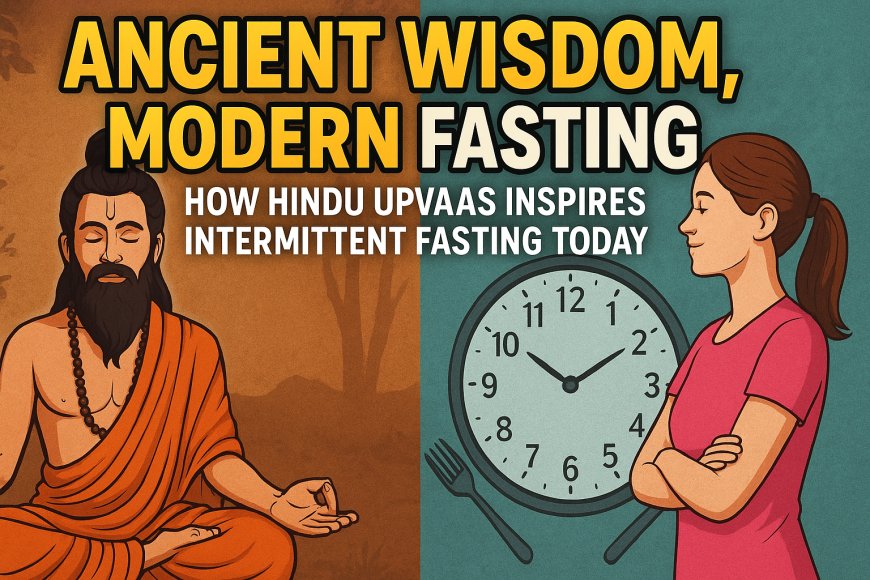Ancient Wisdom, Modern Fasting: How Hindu Upvaas Inspires Intermittent Fasting Today
Discover how ancient Hindu fasting traditions like Ekadashi and Ayurvedic ahara-niyam align with modern intermittent fasting methods. Learn the spiritual and scientific synergy behind timeless health practices.

Ancient Wisdom, Modern Fasting: How Hindu Upvaas Inspires Intermittent Fasting Today
When it comes to health and wellness, the West is catching up with what ancient Indian traditions have taught for millennia. Intermittent fasting — now a buzzword in modern nutrition — isn’t a new discovery. It has deep roots in the Hindu practice of Upvaas (उपवास) and Vrata, where fasting isn't just about skipping meals — it’s about spiritual, mental, and physical discipline.
Upvaas and Vrata: More Than Just Not Eating
In Hindu scriptures, Upvaas means “to stay near the divine.” It's about mental restraint, speech control, and sensory discipline — not just calorie restriction. Followers often practice this through regular fasts like Ekadashi, Purnima, Amavasya, and Chaturthi.
These fasts often involve:
-
Nirjala (no water)
-
Phalahar (only fruits and milk)
-
One meal a day
If you’re familiar with terms like OMAD (One Meal A Day) or 16:8 fasting, you’ll see the uncanny resemblance.
Ayurveda: Giving the Gut a Break
In Ayurveda, digestion is the foundation of health. It recommends:
-
Avoiding food after sunset
-
Eating after sunrise
-
Natural 12–14 hour overnight fasting window
This aligns with circadian rhythm fasting and modern advice to stop eating 3–4 hours before bedtime — a concept promoted by both science and spiritual tradition.
Bhagavad Gita’s Balanced Approach
In Bhagavad Gita (6.16–6.17), Krishna says:
“Yogi neither eats too much nor abstains entirely... moderation is key.”
This reflects the balanced approach of modern fasting: avoid extremes, eat mindfully, and fast with purpose.
Ekadashi: The Original 24-Hour Fast
Observed twice a month, Ekadashi is a powerful spiritual detox. Some devotees even avoid water — a deeper fast than most modern versions.
Modern science now backs this up with studies on autophagy, the body's way of cleaning out damaged cells, which activates during 24+ hour fasts. Sound familiar?
Science Catches Up with Scripture
Recent studies have shown that fasting:
-
Boosts insulin sensitivity
-
Triggers cellular detox
-
Enhances mental clarity
-
Elevates spiritual awareness
These benefits echo ancient goals of sharir-shuddhi (body purification) and man-shuddhi (mind purification) found in Hindu texts.
Conclusion: Bridging Tradition and Modern Health
Fasting isn’t just a trend. It’s a timeless practice rooted in ancient spirituality — now validated by modern science. Hindu Upvaas offers a deeper meaning and purposeful discipline behind intermittent fasting.
Next time you skip a meal, remember — you’re partaking in a sacred tradition that’s thousands of years old.































